- Home
- Simon Beckett
The Calling Of The Grave dh-4 Page 2
The Calling Of The Grave dh-4 Read online
Page 2
With the killer behind bars, the story faded from the public eye, the missing girls just more victims whose fates were unknown.
That might be about to change.
Standing out like a beacon on the drab moorland was a bright blue forensic tent. It was roughly halfway between the road and the rock formation, a short distance off to one side of the rugged dirt track that linked the two. I stood for a moment in the fine drizzle, breathing in the fecund scent of wet peat as I wondered what I'd find inside.
Then I set off along the track towards it.
Chapter 2
A corridor of police tape had been strung from the midway point of the track out to the forensic tent. The moor had been churned into black mud by the constant tramp of feet, and my boots squelched as I walked between the parallel lines of flapping tape. The area around the tent had been cordoned off, and a uniformed dog- handler stood guard at the opening. He shifted from foot to foot to keep warm as he and the dog, a German Shepherd, watched me approach.
'I'm here to see DCS Simms,' I said, a little out of breath.
Before he could say anything the tent flap was thrown back and a man appeared in the gap. He was in his forties but seemed to aspire to be older. His face was remarkably unlined, and as if to offset the blandness of his features he'd cultivated a moustache that gave him a military bearing. The white overalls he wore somehow didn't look right on him. He'd pushed back the protective hood, and the black hair beneath it had managed to stay so neatly combed it looked moulded.
'Dr Hunter? I'm Simms.'
I'd have guessed as much even if I hadn't recognized his voice. It was peremptory and officious, confident in its authority. His pale eyes flicked over me and in that moment I felt that, for better or worse, I'd been swiftly assessed.
'We were expecting you half an hour ago,' he said, before disappearing back inside.
Nice to meet you, too. The dog-handler moved aside to let me through, tightening his grip on the dog's harness. But I was uncomfortably aware of the German shepherd's unblinking stare as I went past them and into the tent.
After the open space of the moor it seemed cramped and crowded inside, a confusion of overalled figures. The diffused light from the blue walls had an ethereal quality. The atmosphere was moist and clammy, with a mustiness disconcertingly evocative of camping. Beneath it was another odour, of freshly turned soil and something far less benign.
The grave was in the centre.
Portable floodlights had been set up around it, steaming slightly in the damp air. Metal stepping plates had been put down around a rectangle of dark peat, framed by a grid of string. Someone I took to be a SOCO knelt over it, a big man who held his gloved hands poised in the air like a surgeon interrupted in theatre. In front of him, a muddy object was poking through the peaty soil. At first glance it could have been anything – a stone, a knotted root – until you looked more closely.
Thrusting out of the wet earth, its bones visible through rags of flesh, was a decomposing hand.
'I'm afraid you've missed the pathologist, but he'll be coming back when the body's ready to be removed,' Simms said, pulling my attention from the grave. 'Dr Hunter, this is Professor Wainwright, the forensic archaeologist who's going to be supervising the excavation. You may have heard of him.'
For the first time I took stock of the figure kneeling by the graveside. Wainwright? I felt my stomach sink.
I'd heard of him, all right. A Cambridge don turned police consultant, Leonard Wainwright was one of the highest-profile forensic experts in the country, a larger-than-life figure whose name lent instant credibility to an investigation. But behind the donnish public image Wainwright had a reputation for being ruthless with anyone he considered a rival. He was an outspoken critic of what he dubbed 'fashionable forensics', which amounted to pretty much any discipline that wasn't his own. Much of his ire had been focused on forensic anthropology, an upstart field that in some respects overlapped with his own. Only the previous year he'd published a paper in a scientific journal ridiculing the idea that decomposition could be a reliable indicator of time since death. 'Total Rot?' the title had crowed. I'd read it with amusement rather than annoyance.
But I hadn't known then that I'd have to work with him.
Wainwright heaved himself to his feet, knees cracking arthritically. He was around sixty, a giant of a man with mud-stained overalls stretched taut over his big frame. In the white latex gloves his meaty fingers resembled overstuffed sausages as he pushed off his mask, revealing craggy features that might charitably have been called patrician.
He gave me a neutral smile. 'Dr Hunter. I'm sure it'll be a pleasure working with you.'
He spoke with the rumbling baritone of a natural orator. I managed a smile of my own. 'Same here.'
'A group of walkers found the grave late yesterday afternoon,' Simms said, looking down at the object emerging from the soil. 'Shallow, as you can see. We've probed and there appears to be a layer of granite no more than two feet below the surface. Not a good place to bury a body, but fortunately the killer didn't know that.'
I knelt down to examine the gelid dark soil from which the hand protruded. 'The peat's going to make things interesting.'
Wainwright gave a cautious nod, but said nothing. As an archaeologist he'd be even more familiar than me with the problems presented by peat graves.
'It looks as if rain washed off the top layer of soil from the hand, then animals finished unearthing it,' Simms continued. 'The walkers found the hand sticking out of the ground. Unfortunately, they weren't certain what it was at first, so they dug away some of the soil to make sure.'
'Lord protect us from amateurs,' Wainwright intoned. It might have been coincidence that he was looking at me.
I knelt down on one of the metal stepping plates to examine the hand. It was exposed from the carpal bones of the wrist. Most of the soft tissue had been gnawed away, and the first two fingers, which would have been uppermost, were completely missing. That much was only to be expected – larger scavengers like foxes, and even bigger birds like crows or gulls, would have been more than capable of detaching them.
But what interested me was that, beneath the teeth marks left in the bone, the broken surfaces of the phalanges looked smooth.
'Did any of the walkers tread on the hand, or damage it while they were digging?' I asked.
'They claim not.' Simms' face was expressionless as he looked at me. 'Why?'
'Probably nothing. Just that the fingers are broken. Snapped cleanly by the look of things, so it wasn't done by an animal.'
'Yes, I had noticed,' Wainwright drawled.
'You think that's significant?' Simms asked.
Wainwright didn't give me a chance to answer. 'Too soon to say. Unless Dr Hunter has any theories…?'
I wasn't about to be drawn. 'Not yet. Have you found anything else?' The area inside the tent would have already been picked clean for evidence by SOCOs.
'Only two small bones on the surface that we think are a rabbit's. Certainly not human, but you're welcome to take a look.' Simms was looking at his watch. 'Now, if there's nothing else, I have a press conference. Professor Wainwright will brief you on anything you need to know. You'll be working under his direct supervision.'
Wainwright was watching me with an expression of mild interest. While the pathologist would have final say over the remains, as a forensic archaeologist responsibility for the excavation would naturally fall to him. I didn't have a problem with that, at least in theory. But I knew of cases where interred bodies had been damaged by inept or over-enthusiastic excavations, and my job wasn't made any easier when a skull had been shattered by a pickaxe or a spade.
And I'd no intention of being treated like Wainwright's assistant.
'That's fine, as far as the excavation goes,' I said. 'Obviously, I'd expect to be consulted on anything that might affect the remains themselves.'
There was a silence inside the tent. Simms studied me coldly. 'Leonard and I
have known each other for a long time, Dr Hunter. We've worked on numerous inquiries together in the past. Very successfully, I might add.'
I wasn’t 'You came highly recommended, but I want team players. I have a very personal stake in this investigation, and I won't tolerate any disruptions. From anyone. Do I make myself clear?'
I was aware of Wainwright watching, and felt sure that Simms had been primed by the archaeologist. I felt myself bristle at his attitude, hut I'd worked with enough difficult SIOs to know better than to argue. I kept my own face as studiedly neutral as his.
'Of course.'
'Good. Because I'm sure I needn't tell you how important this is. Jerome Monk may be behind bars, but as far as I'm concerned my job isn't finished until his victims have been found and returned to their families. If – if- this is one of them, then I need to know it.' Simms stared at me for a moment longer until he was satisfied he'd made his point. 'Now, if we're done I'll leave you gentlemen to your work.', He brushed out through the tent flaps. Neither Wainwright nor I spoke for a moment. The archaeologist cleared his throat theatrically.
'Well, Dr Hunter, shall we make a start?'
Time seemed suspended under the glare of the floodlights. The dark peat was reluctant to relinquish its hold on the body, clinging wetly to the flesh that gradually emerged from below the surface. Progress was slow. With graves dug in most types of soil, the grave shape or 'cut' is usually easily defined. The infill soil that's been removed and then replaced is looser and less compact than the undisturbed earth around it, making it relatively easy to identify the edges of the hole. With peat the demarcation is less obvious. It soaks up water like a sponge, so it tends not to break up like other soils. The grave cut can still be found, but it requires more care and skill.
Wainwright had both.
His sheer physical presence dominated the enclosed space within the gently billowing blue walls. I'd half expected to be delegated to the sidelines, but he'd been unexpectedly happy for me to help with the excavation. Once my pride had stopped stinging, I was forced to appreciate just how good the forensic archaeologist was. The big hands were surprisingly deft as they carefully scraped away the moist peat to expose the buried remains, the thick fingers as precise as any surgeon's. We worked side by side, kneeling on the metal stepping plates laid out beside the grave, and as the body gradually emerged from the dark earth I found myself revising my earlier impressions of the man.
We'd been working in silence for a while when he used his trowel to scoop up two halves of an earthworm severed by a spade. 'Remarkable things, aren't they? Lumbricus terrestris. Simple organism, no brain and barely any nervous system to speak of, and they'll still grow back when you chop 'em in half. There's a lesson for you: overcomplicate at your peril.'
He tossed the worm into the heather and set down the trowel, wincing as his knees cracked loudly. 'This doesn't get any easier with age. But then what does? Still, you're too young to know about that. London man, aren't you?'
'Based there, yes. You?'
'Oh, I'm a local. Torbay. Driving distance, thank God, so I don't have to be put up in whatever fleapit the police have found. Don't envy you that.' He rubbed his lower back. 'So how're you finding Dartmoor so far?'
'Bleak, from what I've seen of it.'
'Ah, but you aren't seeing it at its best. God's own country, especially for an archaeologist. Largest concentration of Bronze Age remains in Britain, and the whole moor's like an industrial museum. You can still find the old lead and tin mine workings dotted about like flies in amber. Wonderful! Well, to old dinosaurs like me, anyway. You married?'
I was having trouble keeping up. 'Yes, I am.'
'Sensible man. A good woman keeps us sane. Although how they put up with us is another matter. My wife deserves a medal – as she frequently reminds me.' He chuckled. 'Any children?'
'A little girl, Alice. She's five.'
'Ah. A good age. I have two daughters, both flown the nest now. Enjoy them while they're young. Believe me, ten years from now you'll be wondering where your little girl went to.'
I smiled, dutifully. 'We've a while yet before she's a teenager.'
'Make the most of it. And may I give you a tip?'
'Go ahead.' This wasn't the Wainwright I'd been expecting.
'Never take your work home with you. I'm talking figuratively, of course. But detachment is essential in our business, especially when you have a family. Otherwise this will suck you dry. No matter what you see, no matter how appalling, remember that it's just a job.'
He picked up his trowel again and turned back to the remains.
'Actually, I was talking to someone recently who knew you. Said you'd originally trained as a medic?'
'I did a medical degree before switching to anthropology, yes. Who told you that?'
He frowned. 'Do you know, I've been racking my brains trying to remember. My memory's not what it was. I think it was at some forensic conference. We were talking about the new generation making their mark on the field. Your name was mentioned.'
I was surprised that Wainwright would admit even having heard of me. Despite myself I was flattered.
'Quite a leap, anthropology from medicine,' he went on, busily scraping the soil from around an elbow. 'I gather you trained in the US? That research facility in Tennessee, wasn't it? The one that specializes in decomposition.'
'The Anthropological Research Facility. I spent a year there.'
It had been before I'd met Kara, after I'd switched careers and exchanged working with the living for the dead. I waited for the put-down. It didn't come. 'Sounds like quite a place. Although probably not for me. I have to confess I'm not a great fan of Calliphoridae. Disgusting things.'
'I'm not a big fan myself, but they have their uses.' Calliphoridae was the family classification for the blowfly, whose life cycle provided an effective clock for charting decomposition. Wainwright was obviously keen on Latin names.
'I expect they do. Though not in this instance, sadly. Far too cold.' He pointed with his trowel at the remains. 'So, what do you make of it?'
'I'll have a better idea once the body's at the mortuary.'
'Of course. But I'm sure you've already drawn some conclusions.'
I could see the mouth smile under the face mask. I was reluctant to commit myself, knowing how easily things could change once the remains were cleaned. But Wainwright was nothing like the ogre I'd been expecting, and it was just the two of us there. Given his past antipathy to forensic anthropology, it wouldn't hurt to let him know he wasn't the only expert there.
I sat back on my heels to consider what we'd uncovered.
Feat is a unique substance. Formed from partially decayed plant, animal and insect remains, it's an environment that's inimical to most of the bacteria and insects that usually populate the earth beneath our feet. Low in oxygen and almost as acidic as vinegar, it can effectively pickle organic matter, tanning it like specimens in a lab jar. Whole mammoth tusks have been found in peat bogs, while human corpses buried hundreds of years before can emerge uncannily intact.
The body of one man discovered in the village of Tollund, Denmark in the 1950s was so well preserved that at first it was thought he was a recent murder victim. Given the rope tied around his neck he probably had been murdered, though if so it was over two thousand years before.
But the same properties that make peat an archaeological gold mine can also make it a forensic nightmare. Determining an accurate time-since-death interval is difficult at the best of times: without the natural markers supplied by decomposition it can be all but impossible.
In this instance, though, I doubted it would be such a problem. About half of the body was now exposed. It was lying more or less on one side, knees roughly pulled up, upper body curled in a crumpled foetal position. Both the thin top that clung to the torso, through which the outline of a bra could be seen, and the short skirt were synthetic, and contemporary in style. And while I couldn't claim to be an expert, the
high-heeled shoe on the now exposed right foot looked to me like a relatively new fashion.
The entire body – hair, skin and clothes – was caked in viscous black peat. Even so, nothing could disguise the horrific damage that had been inflicted. The outlines of broken ribs were clearly visible beneath the muddy fabric, and jagged bones poked through the flesh of the arms and lower legs. Beneath the clinging mat of hair, the skull was crushed and misshapen, the cheeks and nose caved in.
'Not much yet, apart from the obvious,' I said, cautiously.
'Which is?'
I shrugged. 'Female, although I suppose there's an outside chance it could be a transsexual.'
Wainwright made a scoffing noise. 'God help us. In my day that would never have been an issue. When did things get so complicated? Go on.'
I was beginning to warm to my theme. 'It's difficult to say yet how long the body's been buried. There's some decomposition, but that's probably explained by how close it was to the surface.'
Proximity to the air would allow aerobic bacteria to break down the soft tissues even in a peat grave, albeit at a slower rate. Wainwright nodded agreement. 'So the right timeframe to be one of Monk's victims? Less than two years, say?'
'It could be, yes,' I conceded. 'But I'm not going to speculate just yet.'
'No, of course. And the injuries?'
'Too soon to say if they're ante- or post-mortem, but she was obviously badly beaten. Possibly with some kind of weapon. Hard to imagine anyone breaking bones like that with their bare hands.'

 Where There's Smoke
Where There's Smoke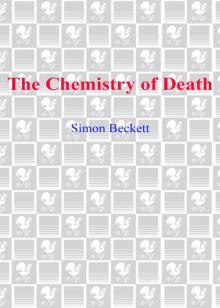 The Chemistry of Death
The Chemistry of Death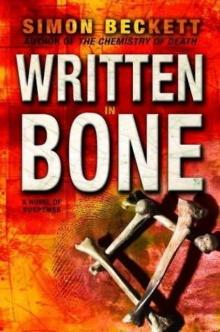 Written in Bone
Written in Bone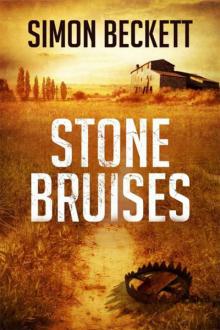 Stone Bruises
Stone Bruises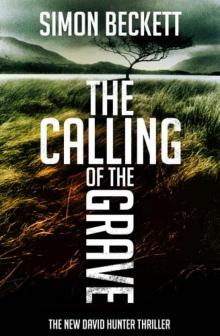 The Calling of the Grave
The Calling of the Grave Whispers of the Dead
Whispers of the Dead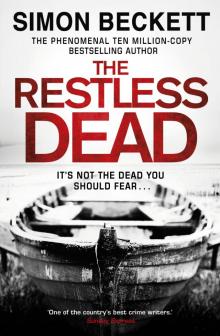 The Restless Dead
The Restless Dead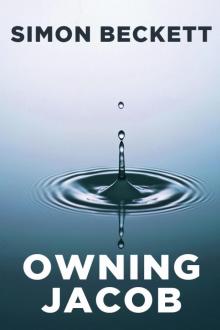 Owning Jacob
Owning Jacob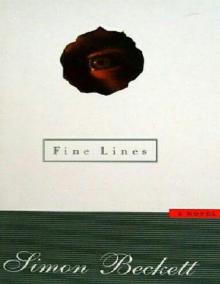 Fine Lines
Fine Lines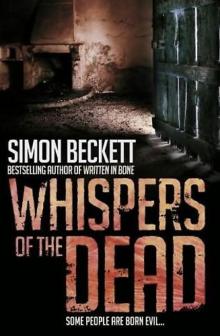 Whispers of the Dead dh-3
Whispers of the Dead dh-3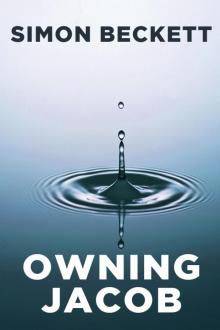 Owning Jacob (1998)
Owning Jacob (1998)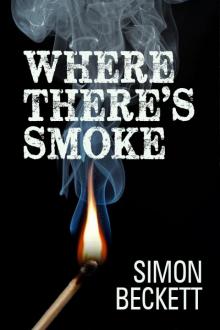 Where There's Smoke (1997)
Where There's Smoke (1997)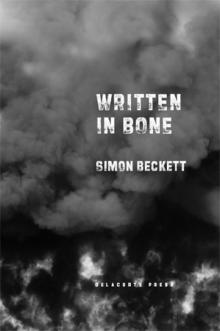 Written in Bone dh-2
Written in Bone dh-2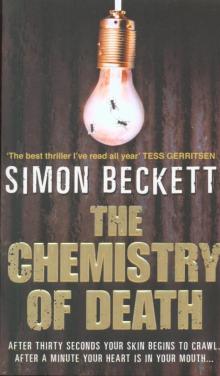 The Chemistry of Death dh-1
The Chemistry of Death dh-1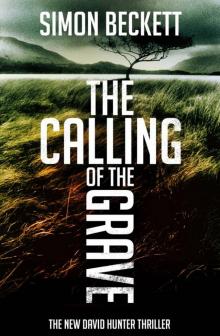 The Calling Of The Grave dh-4
The Calling Of The Grave dh-4